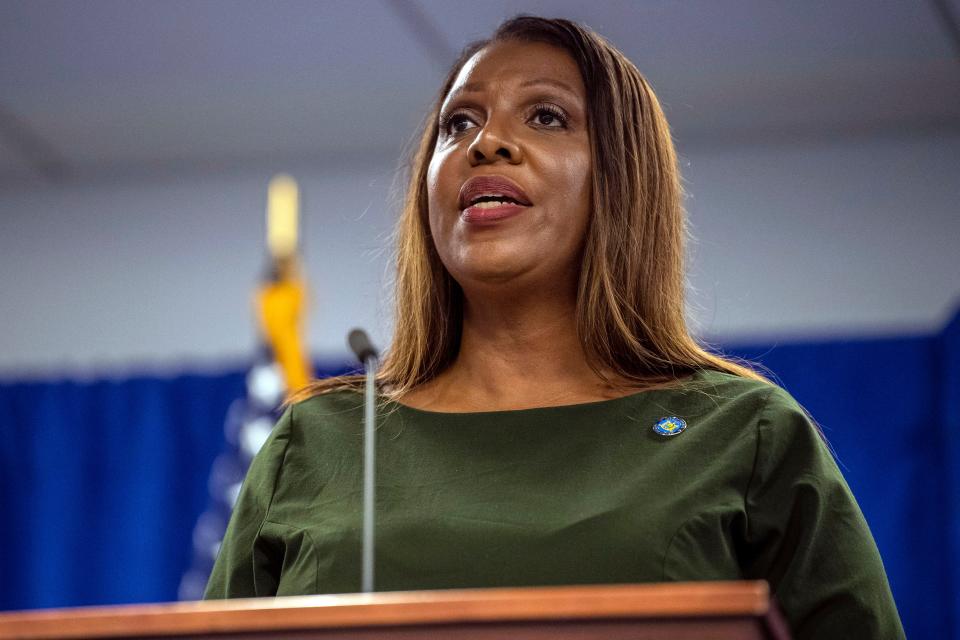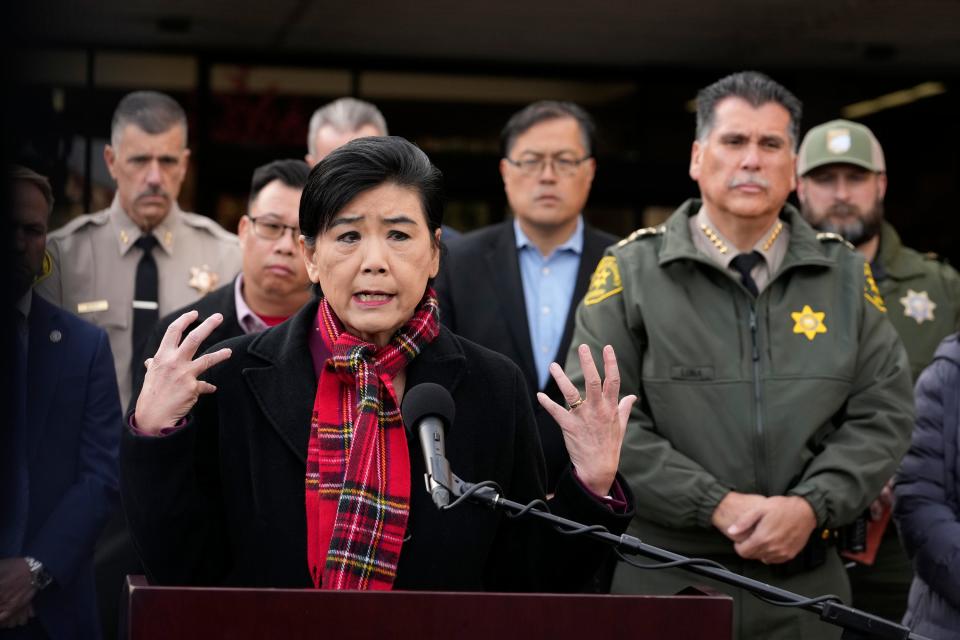Biden promised to address hate crime reporting. 20 months later, here's what's been done.
When President Joe Biden signed a landmark bill on hate crimes in 2021, he said many Asian Americans, Native Hawaiians and Pacific Islanders were afraid to leave their homes after being “attacked, scapegoated, harassed” during the early days of the COVID-19 pandemic.
“We see you,” he told the community, saying his entire administration, including the Department of Justice, would use the new law “to step up” and help solve “a critical problem of hate crimes being underreported.”
Two weeks ago, more than 18 months after the bill's signing, the Biden administration touted its work implementing the hate crimes bill as part of a 30-page strategy report on advancing equity and opportunity in the communities – described by the administration as the first of its kind.
But a closer look by USA TODAY found that key initiatives of the COVID-19 Hate Crimes Act have yet to be launched roughly two years after the legislation sought to bolster hate crime reporting and address the lack of resources available for state and local law enforcement to report attacks as they happen.
The analysis by USA TODAY comes as renewed attacks have put violence directed at Asian Americans back in spotlight.
The FBI did not report an increase in hate crimes affecting the Asian American and Native Hawaiian and Pacific Islander communities in the months after the bill passed. The incidents that were recorded in the agency's publicly facing database were only a small fraction of what has been reported to state authorities and the nonprofit organization Stop AAPI Hate.
Though the bill specifically promised federal funding for state-run hate crime hotlines, those hotlines have not yet been implemented. When the grants are given out in March, only two states will benefit. In the meantime, a handful of states and a nonprofit organization continue to fill the gap.
The bill authorized the Justice Department to use grants to help local agencies report crimes through federal systems, but the department did not provide information to USA TODAY on those efforts.
“In government, things do take time,” said Krystal Ka‘ai, executive director of the White House Initiative on Asian Americans, Native Hawaiians, and Pacific Islanders when asked about the 30-page strategy.
She added that while resources are being directed to make reporting hate crimes more accessible, it will take time to see crimes go down.
“To truly root out hate, you cannot just simply sign a policy or issue a directive and things just change overnight," she said.
The president, who has made racial justice one of his key goals, started his term struggling to get the Senate to confirm his Cabinet picks after senators pushed back on a dearth of Asian American nominees. He is the first president in two decades not to have an Asian American serving at the secretary level.
Yet, members of the community say the Biden administration’s actions stand in sharp contrast to those of his predecessors – especially former President Donald Trump, who has sometimes used racist slurs against Asian Americans.
“They definitely get the issues right and have been engaging with us,” said David Chiu, San Francisco's city attorney and a former California lawmaker. But Chiu emphasized that "you can’t erase thousands of anti-Asian hate incidents overnight, and the tragedies, impact and toll they have taken on our community.”

AAPI strategic plan: Progress happening under Biden, but issues remain
'No safe spaces': For Asian Americans, California shootings add to growing mental health crisis
'We shouldn't have to tolerate it': More Asian Americans are calling out the racism they experience at work
Lunar New Year: Asian Americans mark occasion with resilience
California, other states created hate crime hotlines without Biden administration funding
The biggest initiative in the 2021 hate crimes bill required the Justice Department to issue grants to states to set up hate crime reporting hotlines.
The department has not awarded the grants but is gearing up to award $1.125 million grants to two states to run hate crime hotlines starting March 1 and lasting for 36 months, according to Kara McCarthy, a spokesperson for the department.
The department did not answer USA TODAY’s questions on which states were most likely to get the grants, or why two were chosen. The bill did not specify how many states needed grants.
In the meantime, several states started their own hotlines without federal money.
Oregon’s state government created a hotline at the beginning of 2020 that responds to bias incidents and hate crimes.
New York Attorney General Letitia James announced the state's hate crime hotline in March 2020. That’s in addition to a local hotline in Westchester County, New York.
In California, Gov. Gavin Newsom in September ordered the creation of a hotline called “CA vs. Hate.” The hotline had a soft launch in November. A similar hotline in Los Angeles County launched in August 2020.

Outside government-run resources, the Asian American and Pacific Islander community self-reports incidents to Stop AAPI Hate, which started in March 2020 and received nearly 11,500 reports in its first two years.
Cynthia Choi, a co-founder of Stop AAPI Hate, said people are less likely to report their stories to law enforcement and other government agencies, whether because of language barriers, immigration status, or concerns over whether doing so would be effective.
“They go through this thought process of: ‘Should I do that? Do I want to get entangled with law enforcement? Is this serious enough in nature for me to involve law enforcement?’” Choi said. “And also because of their own experiences where (the response has) been unsatisfactory."
Rep. Judy Chu, D-Calif., chair of the Congressional Asian Pacific American Caucus, said during the early 2021 dustup over Biden’s Cabinet appointments that she was “very disappointed” in the lack of an Asian American nominee. She has since worked with the administration to address concerns that are important to the community.
Chu said the administration worked “immediately” to appoint a special prosecutor to track hate crimes after the 2021 hate crimes bill and praised efforts to allow people to report hate crimes to the FBI in more than 20 languages.
“There certainly was a world of difference when we changed from President Trump to President Biden, and we welcomed that enormously,” she said.

Flawed hate crime data: Over 7,000 hate crimes were reported to the FBI in 2021. Here's why that data is flawed.
'Solidarity is the answer': Amid a rise in hate crimes, Black and Asian Americans are standing together
FBI hate crimes data lags behind reports to states, Stop AAPI Hate
The language in the hate crimes bill allowed, but did not require, the Justice Department to make grants to local law enforcement agencies to train them on hate crime reporting to two main systems – Uniform Crime Statistics and the National Incident-Based Reporting System. The department did not respond to USA TODAY’s questions on the topic.
The latest Uniform Crime Statistics data goes through the end of 2021, capturing the first seven months after the hate crimes bill was signed. The number of hate crimes including a victim who was Asian American, Native Hawaiian or Pacific Islander was 74 in 2019, 126 in 2020 and 118 in 2021.
In contrast, Oregon reported receiving about 1,700 reports in 2021 and 2,500 in 2022. California’s hotline received 55 reports through Jan. 27, before the hotline's hard launch.
Michael German, a fellow at New York University’s Brennan Center for Justice, said that while the Biden administration has made “measurable” improvements to hate crimes reporting, the Justice Department has long relied on state and local governments to report hate crimes, and many law enforcement agencies simply choose not to.
The problem was apparent in the 1990s, when “only about 15% of police departments around the country would acknowledge that hate crimes occurred in their jurisdiction,” German said. In the past couple of years, he said, the FBI has emphasized the National Incident-Based Reporting System, which he called “even worse.”
“Because the data is so bad, it’s hard to make any claims about hate crimes rising or falling," German said. “We have such a little slice of the pie to look at, and that slice is changed by the different methodologies used to collect it, so the fact of the matter is we don’t know.”
Ka‘ai, the executive director of the White House’s initiative, strongly encouraged members of the community to come forward and report their experiences.
“If something happens, they need to report it, and that is something we have been working with trusted community leaders all across the country and to be able to do (with the hate crimes bill),” she said.

Erin Mansfield and Rebecca Morin are reporters on USA TODAY's politics team. Reach them at emansfield@usatoday.com and rmorin@usatoday.com or find them on Twitter at @_erinmansfield and @RebeccaMorin_.
Black male voters: Democrats have a problem with this population. Kamala Harris is trying to fix it.
A dramatic shift: Biden is tapping more and more Black prosecutors for US attorney posts
This article originally appeared on USA TODAY: Biden vowed to address hate crime reporting. Here's what's been done.

 Yahoo Movies
Yahoo Movies 
